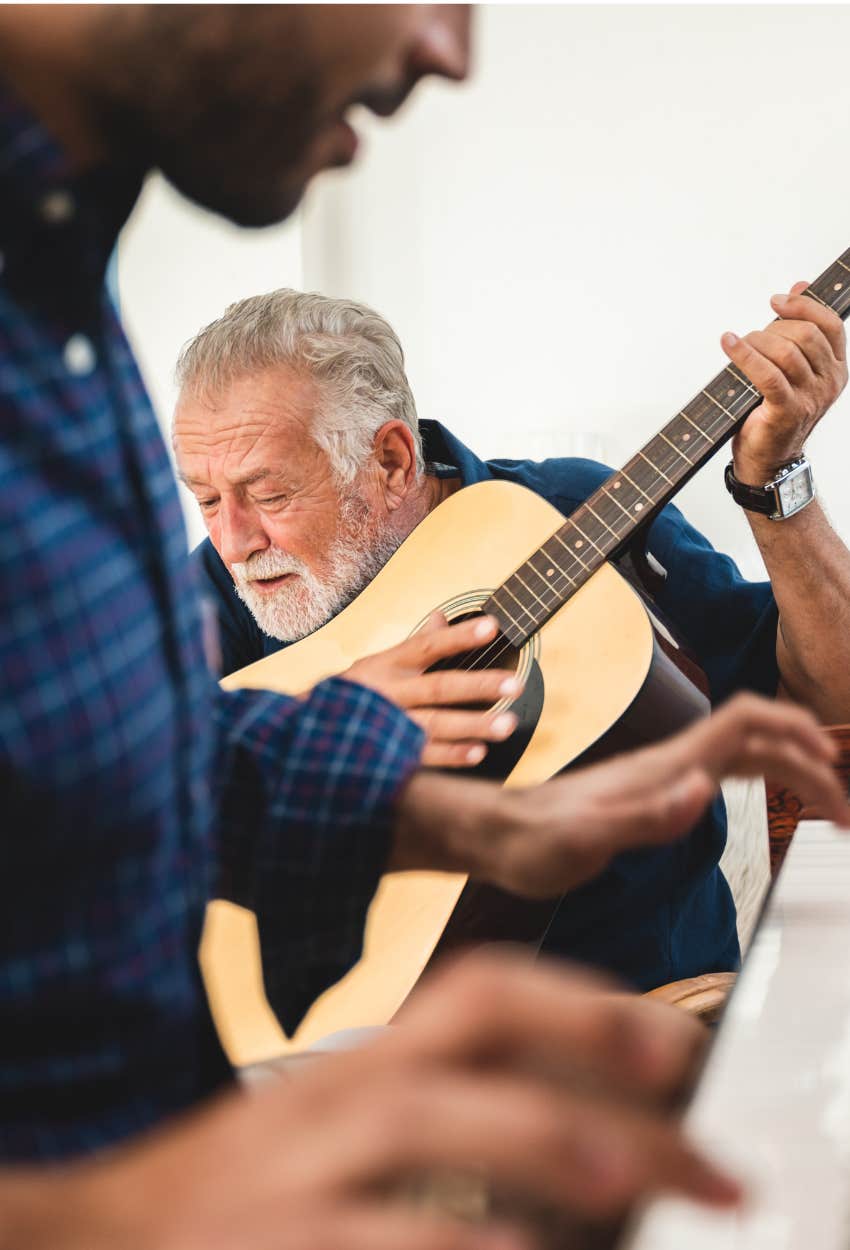Science Says People With This Specific Hobby Stay Mentally Sharp Into Their 80s And Beyond
This is definitely a hobby everyone can do.
 takayuki | Shutterstock
takayuki | Shutterstock Pretty much everything about getting old is daunting, but for many people nothing is more anxiety-inducing than the thought of losing their mental acuity as they age. Especially if you've dealt with someone you love battling dementia or Alzheimer's, cognitive decline can feel downright terrifying. But scientists have found that one of the most common hobbies out there can have major brain benefits and help keep you sharp as a tack long into your golden years.
Studies show that playing music is a hobby that will keep you mentally sharp well into your 80s.
By "playing music," we're not just talking about pressing "play" on your favorite playlist, though that's not without its benefits, too. We're talking about actually playing an instrument. (Including the one in your own throat — singing counts too!)
 ckstockphoto | Canva Pro
ckstockphoto | Canva Pro
Music is usually a part of a child's education, not just for cultural and artistic reasons, but because learning to read and play music has been shown to help with cognitive development in areas as diverse as second-language skills to actual executive functioning.
And it turns out, these benefits can last throughout the lifespan, according to a joint Chinese and Canadian study. But if you've never tickled the ivories or picked up a guitar in your life, don't think it's too late: Even if you take up the hobby late in life, your brain still reaps the benefits.
Playing musical instruments has been shown to retain certain youthful brain features in the elderly.
Basically, playing music slows down the aging of the brain. The study found that playing an instrument helped elderly people retain youthful brain activity, especially where issues relating to sound are concerned, just as perceiving speech in noisy environments.
They found that elderly musicians vastly outperformed their peers when it came to tasks involved with navigating noisy spaces, for example. MRI scans showed the brain networks involved with auditory and motor skills were in better shape in the musicians, too.
One of the study's authors, Dr. Yi Du, likens it to a well-tuned musical instrument itself. "Just like a well-tuned instrument doesn’t need to be played louder to be heard, the brains of older musicians stay finely tuned thanks to years of training," Dr. Du said.
Which makes sense: playing an instrument not only requires multiple senses, but it also involves motor skills. Scores of studies have shown that activities that incorporate motor skills with reasoning tend to be protective of elderly people's brains. It's all part of the "use it or lose it" theory in neuroscience. Staying active with cognitive tasks helps the brain maintain its key functions for longer than those who, for instance, spend their retirement watching TV.
Researchers believe playing an instrument may help the brain 'store' functionality for later in life.
Dr. Du and their colleague, Dr. Lei Zhang, believe their study may point to a controversial theory in neuroscience that is gaining more traction amid similar studies: That our brains may have a sort of reserve system that effectively stores brain function for later, if you will.
Their study found that elderly musicians were not only better at the aforementioned skills for recognizing speech in noisy environments than their peers who weren't musicians, but they were also just as good at it as young people who weren't musicians.
Similar results emerged from experiments that tested the spatial functioning of their brains, basically the interconnected layout of communications between different brain regions or systems. The older musicians' spatial patterns of brain connectivity were far more like young people's than those of non-musicians their own age.
Dr. Zhang also pointed out how a wealth of science has pointed to keeping active with enjoyable activities helps senior citizens' brains age more slowly across the board, so the simple pleasure of playing an instrument likely impacted the study's results as well.
So if you're looking for the moment to pick up a musical hobby, there's no time like the present, regardless of your age. As Dr. Zhang put it, "it is never too late to take up, and stick with, a rewarding hobby such as learning an instrument.”
John Sundholm is a writer, editor, and video personality with 20 years of experience in media and entertainment. He covers culture, mental health, and human interest topics.

